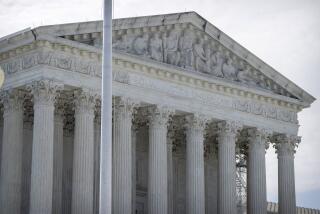Supreme Court upholds most of Trump rule to let religious employers end birth control coverage

- Share via
WASHINGTON — The Supreme Court on Wednesday upheld most of a Trump administration regulation that would free employers from providing contraceptives to their employees if they have a religious or moral objection, potentially leaving more than 120,000 women with no coverage.
In the 7-2 decision, the court goes further than before in shielding companies, colleges and charities from the part of Obamacare that requires employers with more than 50 employees to pay the cost of preventive healthcare, including the full range of contraceptives.
The ruling is a clear win for the Trump administration and religious conservatives, but it is not a final victory. The case will return to an appeals court in Philadelphia, which had blocked the regulation but has not considered all of the possible procedural objections.
In the past, the court had ruled in favor of religious employers and private companies who claimed an exemption based on their religion, including the Hobby Lobby chain of craft stores. But then, the justices also upheld an accommodation proposed by the Obama administration under which the health insurers would step in and provide contraceptives for female workers. The insurers agreed to do so because providing birth control would cost less than paying for a pregnancy and delivery.
But some religious conservatives objected to that approach because it would make them “complicit in sin” if their insurers were involved in providing the contraceptives.
The Trump administration proposed a broader rule to cover more employers and exempt them entirely from the Obamacare regulation. The administration conceded the new regulation, if put into effect, could take away contraceptive coverage from 120,000 women or more.
The rule had been blocked on the grounds that the Department of Health and Human Services did not have the authority to make exemptions to the preventive care law and that the administration did not follow proper procedures.
Justice Clarence Thomas, writing for the majority, said both conclusions were wrong. “We hold today that the departments had the statutory authority to craft that exemption, as well as the contemporaneously issued moral exemption. We further hold that the rules promulgating these exemptions are free from procedural defects.”
Thomas was joined by the other four conservative justices, while Justices Stephen G. Breyer and Elena Kagan concurred in the outcome. Justices Ruth Bader Ginsburg and Sonia Sotomayor dissented.
Ginsburg said the court had wrongly tipped the balance too far in favor of religious claims at the expense of the rights of female employees.
Ignoring what Congress did in protecting women’s health, “this court leaves women workers to fend for themselves, to seek contraceptive coverage from sources other than their employer’s insurer, and, absent another available source of funding, to pay for contraceptive services out of their own pockets,” she said.
State attorneys in Pennsylvania, New Jersey and California sued to challenge the rule, and it was blocked by the 3rd Circuit Court of Appeals in Philadelphia.
Wednesday’s decision in Little Sisters of the Poor vs. Pennsylvania rejected all the reasons cited by the 3rd Circuit for blocking the new rule. But the appeals court did not decide whether the rule was “arbitrary and capricious” in violation of the Administrative Procedure Act.
So while Thomas and four of the conservative justices upheld the Trump administration’s approach, they could not put the rule into effect immediately.
In her concurring opinion, Kagan said it was a close call whether the 2010 law allowed for such a religious exemption, and said she was willing to defer to the government agency. But she said the rule still may not pass muster on procedural grounds. The government did not provide a “reasoned explanation” for its decision to give a broader exemption than it did before, she said.
“This fight is not over,” said Pennsylvania Atty. Gen. Josh Shapiro. “While I am disappointed with much of the majority opinion, I am pleased the court allowed our challenge to the administration’s overly broad rules to proceed.”
Maureen Ferguson, a senior fellow for the Catholic Assn., said the “Little Sisters of the Poor engage in the noblest of front-line healthcare work, selflessly caring for the elderly poor in nursing homes; yet for seven years they have been legally harassed by the Obama-Biden administration and other government officials in an attempt to force them to distribute abortion-inducing drugs in their healthcare plans. Today the Supreme Court ruled that the Trump administration had the authority to grant an exemption for the Little Sisters and other conscientious objectors.”
House Speaker Nancy Pelosi (D-San Francisco) said the court’s decision to “enable the Trump administration’s brutal assault on women’s health, financial security and independence is a fundamental misreading of the statute. The Affordable Care Act was explicitly designed to prevent discrimination against women and to ensure that women have access to preventive care, including contraception.”
More to Read
Get the L.A. Times Politics newsletter
Deeply reported insights into legislation, politics and policy from Sacramento, Washington and beyond. In your inbox three times per week.
You may occasionally receive promotional content from the Los Angeles Times.











